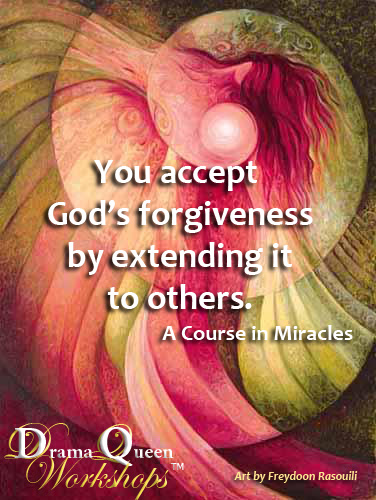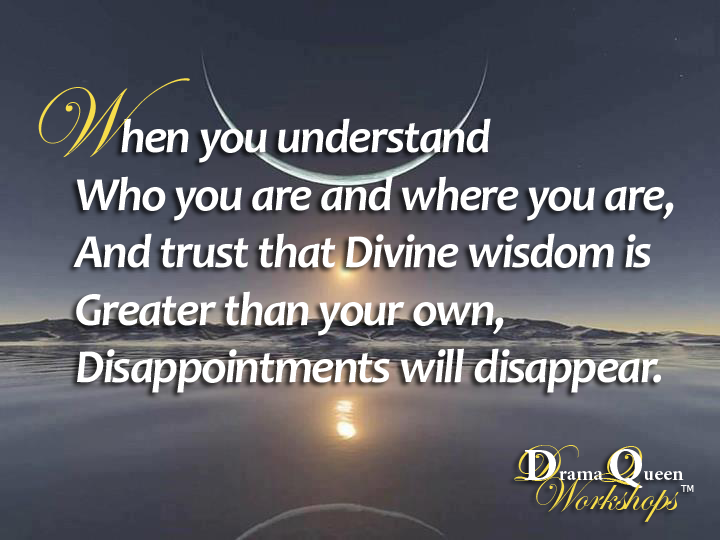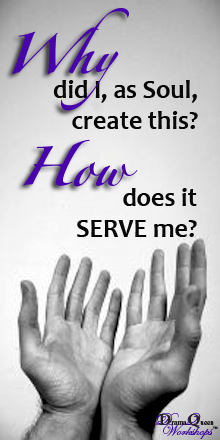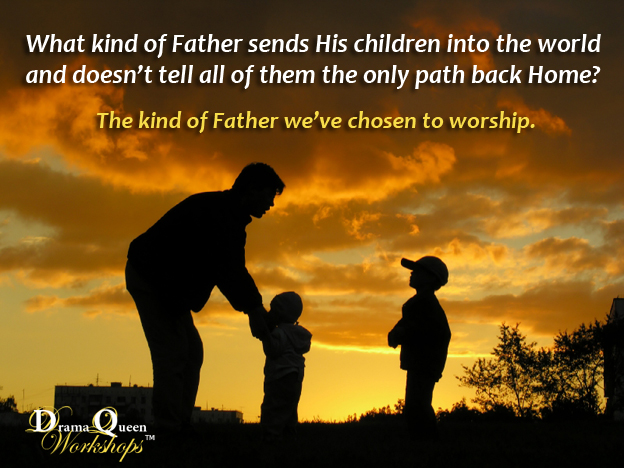A friend recently moaned, “I want my old life back. I want to be able to go out to dinner at a restaurant with tablecloths instead of a Playland.” How many of you can relate to that?
 The global economy and the shift in certain industries has become a stumbling block for millions. But perhaps what has tripped us up more than anything is our eyesight: how we see ourselves, others, and how we perceive and judge our experiences.
The global economy and the shift in certain industries has become a stumbling block for millions. But perhaps what has tripped us up more than anything is our eyesight: how we see ourselves, others, and how we perceive and judge our experiences.
That was at the heart of the discussion last week for the men and women who attended our first online DQWorkshop. We explored two questions: Who are we? Why are we here?
The answers were rather fascinating. When polled, more than 70% of the attendees indicated that they have souls. In other words, they are bodies. But as the discussion progressed, some of them began to recall incidents in their own lives that revealed that they are more than mortal bodies that possess immortal souls. In fact, those recollections prompted them to consider the possibility that they are more likely immortal souls wearing human bodies—”costumes” in DQW-speak.
One attendee, who previously had indicated that she is a body with a soul, suddenly recalled a terrifying experience she’d recently had in the middle of the night: She was fully awake, hovering over her bed, looking down at her sleeping body next to her husband. What did it mean? She wondered.
I’ve never had an out-of-body experience, but I’ve read numerous accounts from those who have. Many have reported experiencing them during near-death or clinical-death episodes. Others enjoy going into deep meditation and leaving their bodies intentionally—something I’ve never considered.
“Did you notice whether you had a body as you hovered up there?” I asked. “Did you have hands, feet—anything?”
“No. I didn’t have a body,”she responded.
“Where was your awareness?” I asked. “Was it in your body?”
“No.”
What she was telling us is that her consciousness and her identity as Self was in the part of her that was outside of the body. Her frightening but insightful experience had revealed a couple of things: 1) We are not our bodies and 2) We are invisible when we’re not wearing a body costume.
I could see the Light go on, even though I couldn’t see her or the other attendees. She had dramatically, yet inadvertently, hit the sweet spot of our webinar: Who are we?
Next question: As invisible spirit wearing bodies, why did we choose to be on this planet, in our respective countries, with our respective families and friends at this time in Earth’s evolution? The answer is different for each of us. As we’ve noticed, there is no cookie-cutter life experience.
What I’ve noticed is that our unique purpose as soul can often be found inside the things that evoke the most passion in our physical selves. If, as soul, we have a purpose for being here, do we want to leave the body without fulfilling it? But often, our soul purpose may be waiting to be discovered behind the things that challenge us most: our stumbling blocks. Many of us don’t even know what’s keeping us from moving forward. Is it:
- Habits?
- Failure to do what’s required?
- People on our path with ill intent?
- And, if we are souls, is it our spiritual history?
 If you believe everything happens for a reason, you’ll agree that these are some issues to seriously consider. This week, we’ll peel away another layer to get closer to your unique soul purpose for being on this planet, in that body, at this time.
If you believe everything happens for a reason, you’ll agree that these are some issues to seriously consider. This week, we’ll peel away another layer to get closer to your unique soul purpose for being on this planet, in that body, at this time.
Perhaps your frustration is rooted in the fact that your physical self and Soul Self are not on the same page; each has different goals. If there’s a battle of wills, guess which one wins?
Join us for the next online workshop, Thursday at 8pm CDT, and unmask your stumbling blocks. See what blessings and insights they hold for you. The online workshop is free. Register today.
“See” you there! Explorations always result in plenty of questions. I’m looking forward to another vibrant Q & A session.




 For those who have registered for the first webinar “Who Are You? Why Are You Here?” look for workshop materials and connection information in your e-mailboxes on Tuesday. If you haven’t registered yet, how long are you going to postpone this important discovery? If you’ve read this far into this post, you are a Seeker. Time to start acting on it. Register
For those who have registered for the first webinar “Who Are You? Why Are You Here?” look for workshop materials and connection information in your e-mailboxes on Tuesday. If you haven’t registered yet, how long are you going to postpone this important discovery? If you’ve read this far into this post, you are a Seeker. Time to start acting on it. Register 
 Most of us believe that we’re granting someone a favor when we forgive them. In reality, we’re doing ourselves a favor: We’re freeing ourselves from the grip of any negative energy associated with the incident.
Most of us believe that we’re granting someone a favor when we forgive them. In reality, we’re doing ourselves a favor: We’re freeing ourselves from the grip of any negative energy associated with the incident. Now, how do you feel about forgiveness? Inspired you to drop everything and start forgiving everyone who’s ever “wronged” you? There are things that have happened to us that we can’t recall or that we’ve protected ourselves from by stuffing those memories in the farthest reaches of our subconscious minds. If those situations are not healed, they can resurface—sometimes violently.
Now, how do you feel about forgiveness? Inspired you to drop everything and start forgiving everyone who’s ever “wronged” you? There are things that have happened to us that we can’t recall or that we’ve protected ourselves from by stuffing those memories in the farthest reaches of our subconscious minds. If those situations are not healed, they can resurface—sometimes violently.

 Explore the powerful question we discussed in Part 1: Why did I create this? How does it serve me?
Explore the powerful question we discussed in Part 1: Why did I create this? How does it serve me?
 Physicist Albert Einstein asserted that we cannot solve problems from the same level of consciousness at which they were created. Perhaps that’s why I’m seeing an increase in requests for one-on-one
Physicist Albert Einstein asserted that we cannot solve problems from the same level of consciousness at which they were created. Perhaps that’s why I’m seeing an increase in requests for one-on-one 
 Whenever I mention my trip to Egypt, others ask: “How did you manifest that? I want to do that!”
Whenever I mention my trip to Egypt, others ask: “How did you manifest that? I want to do that!”
 How did the father react in Jesus’s story? He spotted his prodigal son from a distance and ran to greet him with open arms. He clothed him in fine garments and ordered a feast, much to the dismay of his older and much more respectful son.
How did the father react in Jesus’s story? He spotted his prodigal son from a distance and ran to greet him with open arms. He clothed him in fine garments and ordered a feast, much to the dismay of his older and much more respectful son.




 Human Life Can Be Calculated
Human Life Can Be Calculated